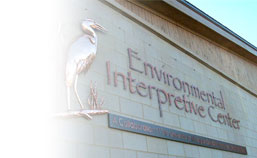
 Melissa Bowlin, assistant professor of biology, studies the ecophysiology of avian migration in an attempt to determine how a costly, risky life-history strategy like migration can evolve.
Melissa Bowlin, assistant professor of biology, studies the ecophysiology of avian migration in an attempt to determine how a costly, risky life-history strategy like migration can evolve.
Over in the School of Education, Christopher Burke, associate professor of science education, has been looking at the impact of integrating school and community gardens into the curriculum on student engagement and school community relationships.
Bowlin and Burke, and their respective research, are part of an inaugural group of 11 University of Michigan-Dearborn faculty members who are using their work to actively pursue activities related to sustainability, conservation, and environmental research and education as part of a Faculty Associates Initiative at the campus’s Environmental Interpretive Center.
Faculty members participating in the Initiative also will be eligible to receive a new campus research grant called the EIC Environmental-Sustainability Research Grant.
The Faculty Associates Initiative was formed back in February as a way to further support the EIC’s mission of promoting human and ecosystem health and sustainability, according to David Susko, associate professor of biology and director of the EIC. Studying the ecology of weedy and invasive plants and how they interact with native species, as well as agricultural crops, Susko also is a member of the 11-member Faculty Associates Initiative group. He is interested in evaluating sustainable agricultural practices.
"The Center strives to enhance opportunities for research collaborations with faculty and students working on environmental and sustainability-related issues,” Susko said. “I believe that the Faculty Associates Initiative and the Environmental-Sustainability Research Grant are two vehicles that will advance this cause."
Other faculty members participating in the Faculty Associates Initiative include:
Anne Danielson-Francois, assistant professor of biology, who studies arthropod mating behavior using both ecological and evolutionary approaches. She also is interested in the impact of anthropogenic pollutants on local populations of arthropods in southeastern Michigan.
Francine Dolins, assistant professor of psychology, investigates navigational and foraging behavior of nonhuman primates, and how ecological challenges and environmental types alter spatial behavior using both lab and field methods. She also works on conservation education in Madagascar and Michigan schools, promoting understanding of human impacts on the environment, scientific principles of ecology, and the importance of conservation of endangered species and their habitats.
Orin Gelderloos, professor of biology and professor of environmental studies, investigates the species composition in relation to the soils and elevation of the ecological communities of the floodplain forests of the Rouge River adjacent to the campus. Of particular interest is the change in future of the species composition due to the death of the three species of ash trees and invertebrates populations, such as earthworms in herbaceous and non-herbaceous areas.
Gail Luera, associate professor of science education, evaluates programs in a wide variety of contexts. She is currently program evaluator for a project that involves teen-aged foster care youth participating in monthly events, including environmental activities at the campus’s Environmental Study Area and for a geoscience research institute. Luera also is a 2010-2011UM-Dearborn Academic Service Learning Fellow and is revising the Environmental Education and Environmental Interpretation courses she teaches to include service-learning projects.
Kent Murray, professor of geology and environmental sciences, studies sources of pollution to the Great Lakes, land use impacts on groundwater and surface water quality, contaminant hydrogeology, and the environmental impacts of hazardous waste sites. His interests also include brownfield assessment and redevelopment, the fate and transport of metals in the environment, and how heavy metals, such as lead and arsenic, affect human health.
Jacob Napieralski, associate professor of geology, is a surface geologist interested in environmental change. Recent research includes reconstructing glacial history, monitoring and modeling urban streamflow, and developing geospatial techniques to analyze environmental and social issues. Napieralski also is interested in enhancing field-based pedagogy and engaging students in environmental sustainability.
Sonia Tiquia, associate professor of microbiology, takes a multidisciplinary approach in her research that seeks to understand the ecology, physiology and genetics/genomics underlying important microbial processes in nature. Her research can be divided in three project areas: (1) Microbial community dynamics and diversity in natural environments and engineered systems; (2) Application of molecular tools in contaminant remediation, global climate change, public health, industrial and agricultural practice; and (3) Waste processing biology and microbiology.
Michael Twiner, assistant professor of biology, studies the impacts of algal toxins on ecological and human health, including characterizing the toxicological effects of marine and freshwater water algal toxins (aka phycotoxins) on humans and aquatic biota using a variety of molecular and cellular approaches.
Each of the above faculty members will be eligible to apply this fall for the new EIC Environmental-Sustainability Research Grant, which would help to support financially his or her scholarship in the areas of sustainability, conservation, and environmental education and research.
The new annual grant, valued at $12,000, is funded through a partnership between the EIC and the Office of Research and Sponsored Programs.
Tenured or tenured-track faculty can apply for this award, provided that he/she is currently an EIC Faculty Associate, or that he/she is collaborating on the proposed project with a co-principal investigator who is an EIC Faculty Associate.
The deadline for applying for the first award will be Dec. 15 of this year.
For more information about the new grant, visit http://www.research.umd.umich.edu/grants/campusgrants/eic-environmental-sustainability-research-grant/.




